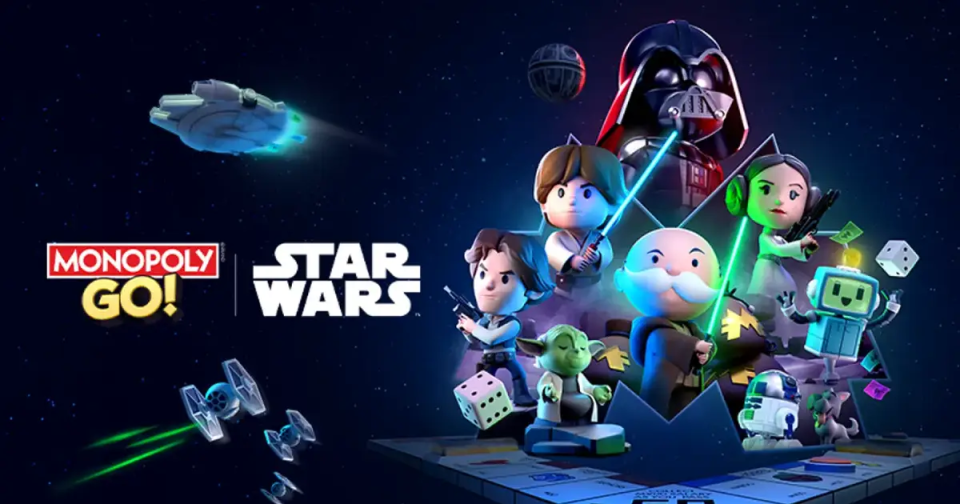Toy Companies Press Play on Gaming

By Mark Seavy
Toy companies are ready to compete in the video game and mobile gaming space by shifting between internal development, outbound licensing, or a combination of the two.
The goal, starting with the emergence of Mattel Electronics in the early 1980s, has always been to establish a home for IP in a growing market. And, with Mattel’s decision to establish a self-published business (the first product is due in 2026) in addition to outbound licensing, the merger of toy brands and video games is picking up speed.
Hasbro’s licensing agreement with developer Scopely for Monopoly Go!, for example, produced $44 million in royalty revenue in Q2 and is generating $12-$14 million in monthly revenue, up from an earlier forecast of $10 million, Hasbro CFO Gina Goetter said. Scopely also launched collaborations with Star Wars for the mobile game during May and June.
At the same time, Hasbro is working with Archetype Entertainment on the Exodus science fiction role-playing game (RPG) that’s due in 2026 for PC and video game consoles, capping development of a title previously announced in 2023. It also has licensed developer Giant Skull for a single player action-adventure title for PCs and video game consoles.
Mattel, meanwhile, licensed Outright Games for Barbie Horse Trails, which will be released October 10 for consoles and PCs. And developer Millstone released the licensed Hot Wheels Unleashed 2 in 2023. The toymaker, whose history in video game includes Pictionary (Nintendo Entertainment System, 1990) and Masters of the Universe (2012), is also developing a title internally that is due in 2026.
“We are pursuing both licensing and internal development in parallel as licensing lets us scale quickly by partnering with developers and expanding our IP reach,” said Marcus Liassides, Head of Digital at Mattel. “At the same time, self-publishing builds long-term value through deeper fan engagement and full creative control. These strategies are complementary and strengthen Mattel’s franchise ecosystem and reflect our long-term commitment to digital entertainment.”
The combined strategies of internal development and outbound licensing are the most recent branch in the toymakers’ video game and mobile gaming strategies.
Mattel launched Mattel Electronics during the first video game boom when it bowed the Intellivision device in 1979. It made another push in 1998 in buying The Learning Co. (whose titles included Carmen Sandiego and Myst) for $3.8 billion but the educational software developer was later sold by Mattel at a loss.
Hasbro, meanwhile, launched Hasbro Interactive in 1995 with a goal of developing games around Monopoly, Scrabble, and other IP and had some success with Rollercoaster Tycoon. But Hasbro later sold the business to Infogrames in 2001 and shifted to outbound licensing with Activision and Electronic Arts.
“We are tapping into the portfolio of collector and [kidult-focused] brands across Hasbro for video and mobile games,” CEO Christopher Cocks said. “We’re building a diverse, high-quality slate that strengthens our connections with fans and unlocks new growth for Hasbro’s digital game portfolio.”
Other toy companies are expanding their efforts in the gaming landscape but have also struggled to find their footing. Spin Master Corp. acquired Swedish game developer Toca Boca in 2016 and revamped it several times. Most recently, Spin Master announced plans to shut down the Toca Boca Days mobile title effective August 25, a foray into multiplayer games that launched last year. It had tested the game across New Zealand, Australia, Sweden, and Canada. With that move, Spin Master will shift focus to Toca Boca World and PikNik, a preschool mobile title that has 479,000 subscribers. PikNik itself was created in 2023 from what had been Toca Boca Junior.
“We’ve made the strategic decision to pivot our focus away from Toca Boca Days to double down on accelerating Toca Boca World,” CEO Christina Miller said. “Building social multiplayer experiences within the Toca Boca universe has provided us with valuable insights. We are now leveraging those learnings and tech we developed to future-proof the Toca Boca franchise.”




